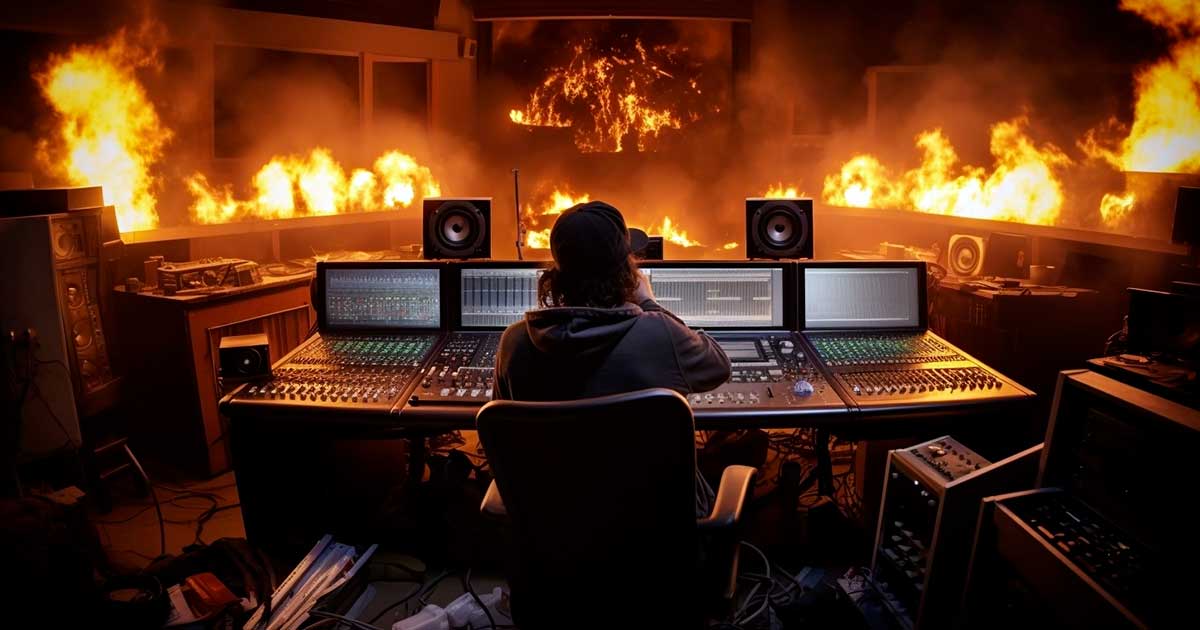Here is a list of things not to do during a music production to ensure the best possible quality and avoid technical and mixing problems:
To avoid certain problems in music production, it’s important not to neglect the acoustics of the room, to record with an appropriate input level, not to use too many effects, to use quality instruments, to have a neutral listening condition, to save regularly, to balance the levels of the various instruments, and not to neglect phase problems.
Let’s take a closer look at what not to do when producing music, and how to avoid these pitfalls.
Neglecting room acoustics
It’s important to have the right acoustics for music production, to avoid resonance or extraneous noise. Unless this is part of your artistic approach, you run the risk of ending up with a “roomy” sound, as in a small room. Try to cut out sound reflections by applying insulating foams to parallel walls and hard, flat surfaces. For vocal recordings, there are specialized insulating foams that surround the microphone, thus avoiding room reverberations. It’s important to note that vocals are generally well compressed, so any defects in the recording will be all the more noticeable! So do some tests before embarking on a more serious project, and see what you can improve.
Recording at too high an input level
Once recorded, saturation is not always recoverable. Digital clipping (digital saturation) can be removed with specialized plug-ins, but these are relatively expensive for simple home studio use (Waves X-Click for example). It is therefore preferable (and recommended) to guard against this kind of problem by adopting audio recording reflexes that will save you frustration and wasted time. Before recording, take your instrument and play the loudest moment of your performance, and try to keep the maximum recording level at -6 dB. You can always compensate for the loss of level by adding gain later.
Using too many effects
Excessive use of effects can make mixing difficult and impair sound quality. Too much is less. The same applies to mixing. Imagine over-cooking your food or over-ironing your shirts – the results are usually not convincing. It’s easy enough to accumulate effects on a single track in order to achieve a sound approaching perfection, but that’s where the trap lies. It’s not about having one perfect track, but a set of instruments that, together, sound good and coherent. So keep in mind that this is a song, and that’s what people are going to listen to, not just one track in it.
Using low-quality instruments
Unless it’s part of your artistic approach, the choice of mediocre or passable quality instruments won’t make up for it later on in the mix. The best you can do is mask the poor quality with reverb or effects. It’s best to keep instruments (virtual or real) of equivalent quality to maintain a cohesive sound and style. Of course, this isn’t a hard and fast rule: you could, for example, use extracts from old films, or samples from old vinyl records.
Use HiFi speakers for mixing
It’s important to have an accurate listening ear for quality mixing. HiFi speakers are not calibrated to reproduce sound faithfully and without coloration, so you’ll need studio monitors with a neutral sound to produce your music in the best possible conditions, or at best studio headphones. One exception to the rule is the Yamaha NS-10, which has a response curve fairly close to that of professional monitors (apart from the low frequencies), making it a must-have for professional production studios in the 1980s.
Forget to save regularly
This avoids losing all the work you’ve done in the event of a technical problem. Backing up is not an option, it’s an imperative. The most important thing is not the machine, but what’s inside it. You could lose a day’s work, or simply a guitar solo that you’ve managed to execute perfectly without being able to re-record it with the same talent. So remember to make regular backups not only of your projects, but also of your software and operating system.
Neglecting level balance
It’s important to balance the levels of different instruments to avoid mixing problems. An instrument that is too loud could unbalance the mix and cause the listener to lose immersion. The classic example is the guitarist who wants to play his guitar solo louder (or too loud) than everything else, without considering the perspective of the average listener (who is not necessarily a guitarist). If your mixing isn’t good, your mastering won’t save it, and will suffer as a result.
Neglecting phase problems
A track doubled on the left and right with a delay, effects galore, a forgotten or hidden track… these things can cause phase problems that will disturb you when mixing. It’s best to take things one step at a time when recording, and avoid accumulating so many tracks that you don’t know which track plays which instrument. Remember to take note of the instrument name before recording. You’ll be better able to sort them out if you have lots of tracks, and you won’t run the risk of phase problems caused by interactions between similar tracks. It is also possible to reverse the polarity of a track in order to overcome a phase problem (or phase shift), but you’ll have to go by ear or use tools to detect potential phase problems in your track. Waves’ InPhase, for example.
Don’t delegate
If you’re the type of person who wants to do everything yourself, but you’re not patient or want to get things done quickly, even if it means that the quality of your work suffers. You’d be better off calling in a third party or a professional. After all, a poorly executed production step can easily destroy all the work done previously. For example, mastering is a crucial step in making your track listenable in all conditions. If you can’t master properly, not only will you be disappointed, but so will your listeners. If you have no other choice, hire a sound engineer to master your track. Prices can vary from $60 to €120. As a last resort, you can also do your mastering online using artificial intelligence mastering services (paid or free). But remember that the result won’t be up to the same standard as that achieved by a professional, a human with real ears and real expertise.
Conclusion
By following these tips, you should be able to avoid some of the music production pitfalls that can waste your time and energy. You’ll have a good foundation in terms of workflow and recording, and the quality of your work will be all the better for it.

